Podcast: Download (Duration: 12:50 — 12.0MB)
Get Notified Of Future Episodes Apple Podcasts | Spotify | Amazon Music | Android | Blubrry | Gaana | TuneIn | Deezer | Anghami | RSS | More
In the episode:
01:27 – Do what energizes
02:19 – Are you really a morning person?
05:43 – Break workaholism by knowing THIS
07:02 – Take things off your plate
08:14 – The most-ignored, easiest thing to do
09:15 – Releasing the overwhelm
11:05 – Spend a lot less time HERE
Let James show you how to achieve much more by working a lot less. Click HERE
Transcription:
James Schramko here. Welcome back to SuperFastBusiness.com. Today’s episode, 552, I’m sharing with you seven tips to make sure you are being productive and never feeling guilty about taking time off. As I’ve been writing my book, which is coming out later this year, 2017, or early 2018, I’m just putting the finishing touches to some chapters. And recently, I had a podcast, episode 550, called Perhaps You’re Measuring Success Wrong, which really resonated with people around me. I got a lot of emails, and shares, and comments, and people said, “Yes, you’re speaking to me.”
So I wanted to just continue on this theme and help you reduce some of this overload and overwhelm and guilt that comes around from the idea of being a workaholic. The hustle, grind, pushing the limits. So I want to give you seven useful tips to make sure that you’re being productive but not feeling guilty. So let’s get straight into this.
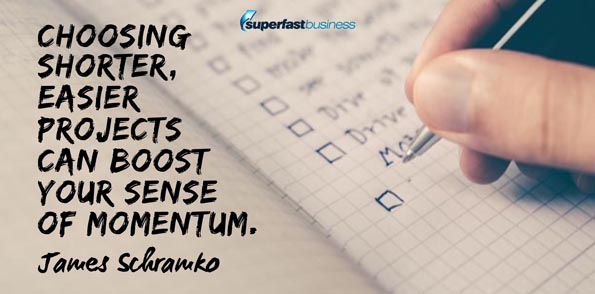 1 – Choose projects that energize you
1 – Choose projects that energize you
Tip number one is choose projects that energize you, and be realistic about how much can be achieved by you in a month. Remember, you’ve got about 160 productive hours and when those hours are gone, you get blunt. Choosing shorter, easier projects can definitely boost your sense of momentum. You should expect and really want whatever result you’re doing all this work for.
So whatever goals you’ve set, whatever your mission is, should mean something to you. If you don’t want it or you’re not prepared to pay the price for it, you’re just a dreamer heading for disappointment. So choose these projects well. I’ve also done an episode on Which Project You Should Work On. So you could look up that episode as well. That episode was 545 – Which Product or Service Should You Focus On? I think that will help you.
 2 – Work at the prime productivity parts of the day
2 – Work at the prime productivity parts of the day
Tip number two, work at the prime productivity parts of the day. Often this will be the first thing in the day or you hear plenty of people talking about doing things very early in the morning. I used to think I was a PM person, like a nighttime person. I did most of my business building between 9:30 and 3:00 in the morning, 9:30 p.m. and 3:00 in the morning, because I had to. I had a job during the day.
The funny thing is when I quit my job about nine years ago, the first thing I did was sleep in because I was just so exhausted. And I did a little bit of work during the mid-morning or mid-afternoon and then a fair bit of my work at night. I more or less just didn’t go to work during the day but still worked at night, and I did that for many years. But when I moved to the beach about five years ago, something interesting happened. There’s no blinds on the windows here. The sun comes up at about 6:00 in the morning, 6:20 in the morning depending on the season, and it wakes you up.
And what I’ve found is, if you do things like not wear sunglasses, then you will reset the melatonin release in your body. You’ll actually start getting tired at night if you do activities like I do with my daily surfing. And if you spend less time on computers like I do, I spend about a quarter of the time that I used to spend on computers, I dropped from about 100 hours a week to 20-odd hours a week, and you will actually be naturally tired at night and you’ll want to go to bed earlier.
I tend to feel a bit sleepy around 10 o’clock. So for a while there, I set an alarm to go to bed early because what I noticed is if I actually stay up too late then it really ruins my next day. But if you do feel excited about a project, if you do come home after dinner and you’ve had a great conversation and you want to do the work, that’s fine. I’m not saying don’t do it at night. I’m just saying you might be surprised if you think you’re an afternoon person or if you think you’re a morning person, challenge it. Try working at a different time of the day.
I definitely dismiss this whole notion of nine to five, Monday to Friday. I think that’s crazy. Putting on a suit and driving a car to some other office for eight hours a day is even crazier. So instead of slogging away for eight hours a day, regardless of how motivated you are or how energized you are, if you don’t feel completely into doing the work, then just have some time off. Play PlayStation or watch Netflix or go to the cinema when no one is there or have a surf. Do something during the day while other people are slogging away and you will still get more done.
“You can be more productive by working less.”
The thing that I was most shocked about is how much more productive I am when I work so much less. If it becomes a constant habit that you are taking time off because you’re just not into doing the work, then I’d question your motivations or your goals again. I’d go back to see point number one. And if it becomes constant, then just start with a daily discipline and build up to more intense projects.
So force yourself to do something every morning until it just becomes normal. Like if you were to start having a cold shower every day, it’s not going to be great the first few times but you’d be doing it for the health benefits and you would start to actually get immune to it and it’ll become normal. Because I think as humans, we normalize. We get used to things, which is why we get so comfortable, which is why often we get flat lining with our business and into a point of stasis where we’re not making any significant impact.
3 – Measure your Effective Hourly Rate
Step number three, measure your Effective Hourly Rate. Effective Hourly Rate is such a great indicator to help us break workaholism, and it’s simply this concept of the amount of profit that you make divided by the number of hours worked to get that profit. So in a month, you might look at how many hours you worked, you might look at how much revenue you made, you might subtract all of your fixed and variable costs to end up with your profit, you divide your profit by the number of hours worked – that is your effective hourly rate.
The thing is, the number gets higher when you work on the same project for less time. So your dollars per hour ago goes up. It really is the antidote for Parkinson’s Law, which as you know, is work expands to fill the time available. If you’ve got no limit, which a lot of entrepreneurs have, then they can actually spend a long time on something. And you know what I’m talking about. If you’ve ever had to do a presentation, or put together an e-mail series, or God help you, write a book, then you’re probably taking a lot longer than it really could be done. Probably the actual time you spend on the thing is very short but you’re padding it out because of procrastination, or lack of interest, or you’re trying to do work when you’re not at your peak. If you combine a deadline or a forced stop time to make this even more powerful, I think your effective hourly rate is going to skyrocket.
4 – Hire a team
Tip number four is hire a team. Have others take care of any lower effective hourly rate activities and anything you just don’t enjoy. Get that taken off your plate. I did a fantastic presentation inside SuperFastBusiness membership about the four mistakes that managers make and how to fix them when it comes to teams. So if you’re finding it a struggle with the team, this is one of my absolute strengths. I’ll be happy to coach you inside SuperFastBusiness membership to help you build a team. I’ve even got a good supply now of where to get a great virtual assistant. So ask me inside SuperFastBusiness if you need help with that.
“Get an enormous amount done with little input.”
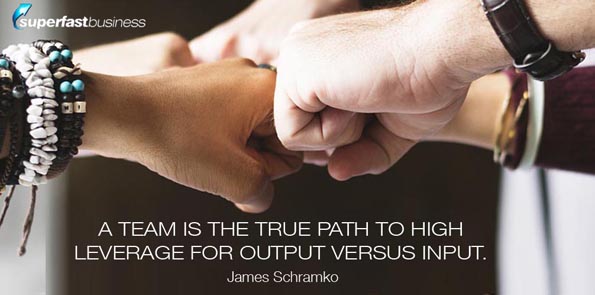 And this is the true path to high leverage for output versus input. You can get an enormous amount done with very little input if you have a little army behind you helping you. And I know it sounds like a dream, if you’re doing everything right now, but you should not be doing everything right now, and I’ve gone into this whole topic, and I’ve got lots of suggestions on how you can get yourself off the tools, so to speak. Unless you’re a professional website designer, you should not be logging into WordPress. So these are the things you should be getting someone else to do.
And this is the true path to high leverage for output versus input. You can get an enormous amount done with very little input if you have a little army behind you helping you. And I know it sounds like a dream, if you’re doing everything right now, but you should not be doing everything right now, and I’ve gone into this whole topic, and I’ve got lots of suggestions on how you can get yourself off the tools, so to speak. Unless you’re a professional website designer, you should not be logging into WordPress. So these are the things you should be getting someone else to do.
5 – Sleep
Tip number five is sleep. This one is probably the easiest one of all to do and the one that most people are ignoring. This is the absolute foundation. Most adults do not get enough sleep. Sleeping restores your body and it lets your brain heal and become more effective. Your subconscious is working away there while you are asleep, working on the big problems that you have while your little sort of immediate conscious memory is just relaxing and having some time off. Basically, if you just don’t get enough sleep, you’re overcooking yourself, and you’re running blunt. Most accidents happen, most bad decisions happen when people are tired.
“Most accidents and bad decisions happen when people are tired.”
Reducing electronic activities prior to bedtime and keeping devices in another room altogether will help you. And set an alarm to go to bed so that you set yourself up for good tomorrow. I would set my alarm for 10 p.m. while I train myself that that’s a good time to go to sleep. But now I’m naturally tired and I just start falling asleep, and I wake up early, and I’m energized.
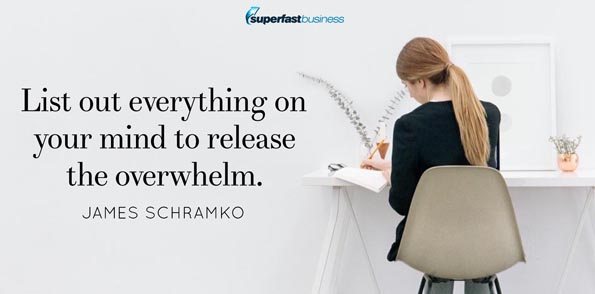 6 – List out everything on your mind
6 – List out everything on your mind
Tip six, list out everything on your mind to release the overwhelm. You’re carrying around all this stuff. It’s like a computer full of cache. You’ve got to clear the cache. So list everything in your mind. Just put it all on paper. And once it’s on paper, just circle a couple of things that are really important and transfer those to your to-do list or a post-it note on your computer screen and leave the rest. In fact, the rest of the list could be retrieved later so you can release it from your brain. And if you’re really worried about losing the list, just take a picture of it. Or drag it into Evernote or whatever your process is, but let it go.
I want you to think for a moment. How many gigabytes are sitting on your computer that you have never looked at once since you downloaded and will never look at again? The fact is, you know that it’s there to get if you want and the reality is you probably will never need it again. There’s only a few documents or resources that you will use over and over again. The rest you can chuck.
I’ve created one spreadsheet in a Google document called a life sheet. This is my own system. It’s called a life sheet and it has tabs. And in the tabs are my checklists of things that happen over and over again. It might be a packing checklist for when I travel, which I do almost every month. It could have a copywriting checklist. It could have a how-to-start-a-mastermind checklist. Or a questions to ask on a coaching call checklist. These checklists I refer to many, many times. I can still look at them on a phone or a computer and by now, I’ve actually memorized quite a lot of them.
So they’re there. I use them a lot. But all the other stuff, I can let go. All the thousands of ideas and opportunities that will cross your path, they need to be let go to free your mind up. You want the most processing power available for when you are on the work, which means letting go of this stuff.
7 – Spend less time on Facebook
And tip number seven, and you may not like this, but it certainly made my life better. Spend a lot less time on Facebook. This place will cycle you through a range of emotions and wear you out. You’ll have everything, from anger, frustration, joy, happiness, jealousy. I’m sure these emotions all go through your mind as you’re going on Facebook. But it really is not the place to help you get to where you’re going.
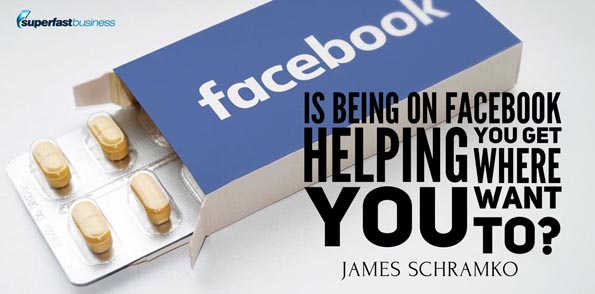 Ask yourself this question – Is spending more time on Facebook helping me get where I want or is it distracting me? This is an important question. What I discovered is that it’s not helping me get where I want. I’ve got my team marketing my page. I do check out my friends and do some social stuff as a break, but that’s a reward for doing a work block. It’s something I enjoy, but I’m not spending an awful lot of time there. And I see people wasting their life there. It really is a serious situation. So that’s tip number seven.
Ask yourself this question – Is spending more time on Facebook helping me get where I want or is it distracting me? This is an important question. What I discovered is that it’s not helping me get where I want. I’ve got my team marketing my page. I do check out my friends and do some social stuff as a break, but that’s a reward for doing a work block. It’s something I enjoy, but I’m not spending an awful lot of time there. And I see people wasting their life there. It really is a serious situation. So that’s tip number seven.
I hope you’ve enjoyed these tips. If anything here’s resonated, I’d love you to make a comment or share this post; perhaps leave a review on iTunes. This is episode 552 – Seven Tips to Make Sure You’re Being Productive and Never Feeling Guilty About Taking Time Off. My goal is to help you make more and work less.
I’m James Schramko. You’ve been listening to SuperFastBusiness. I hope you have a fantastic, restful, peaceful early night and a productive morning.
Join our community of entrepreneurs who do what they love inside JamesSchramko membership
Get more of our show by subscribing on iTunes

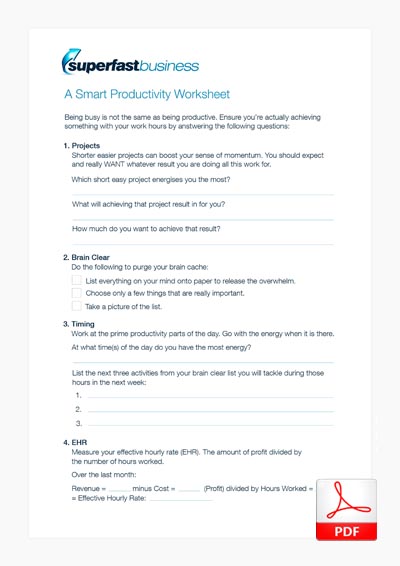
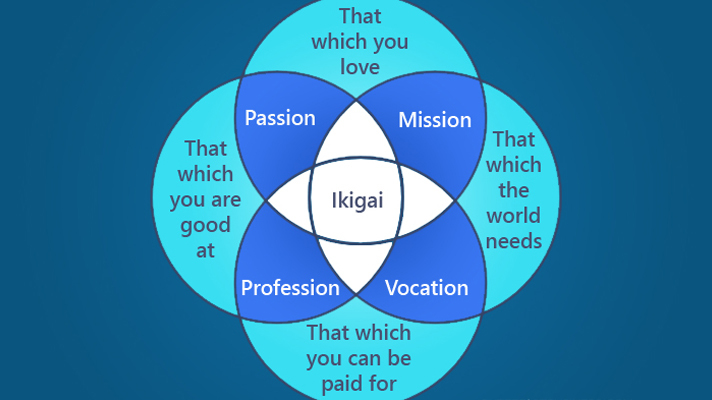








Leave a Reply